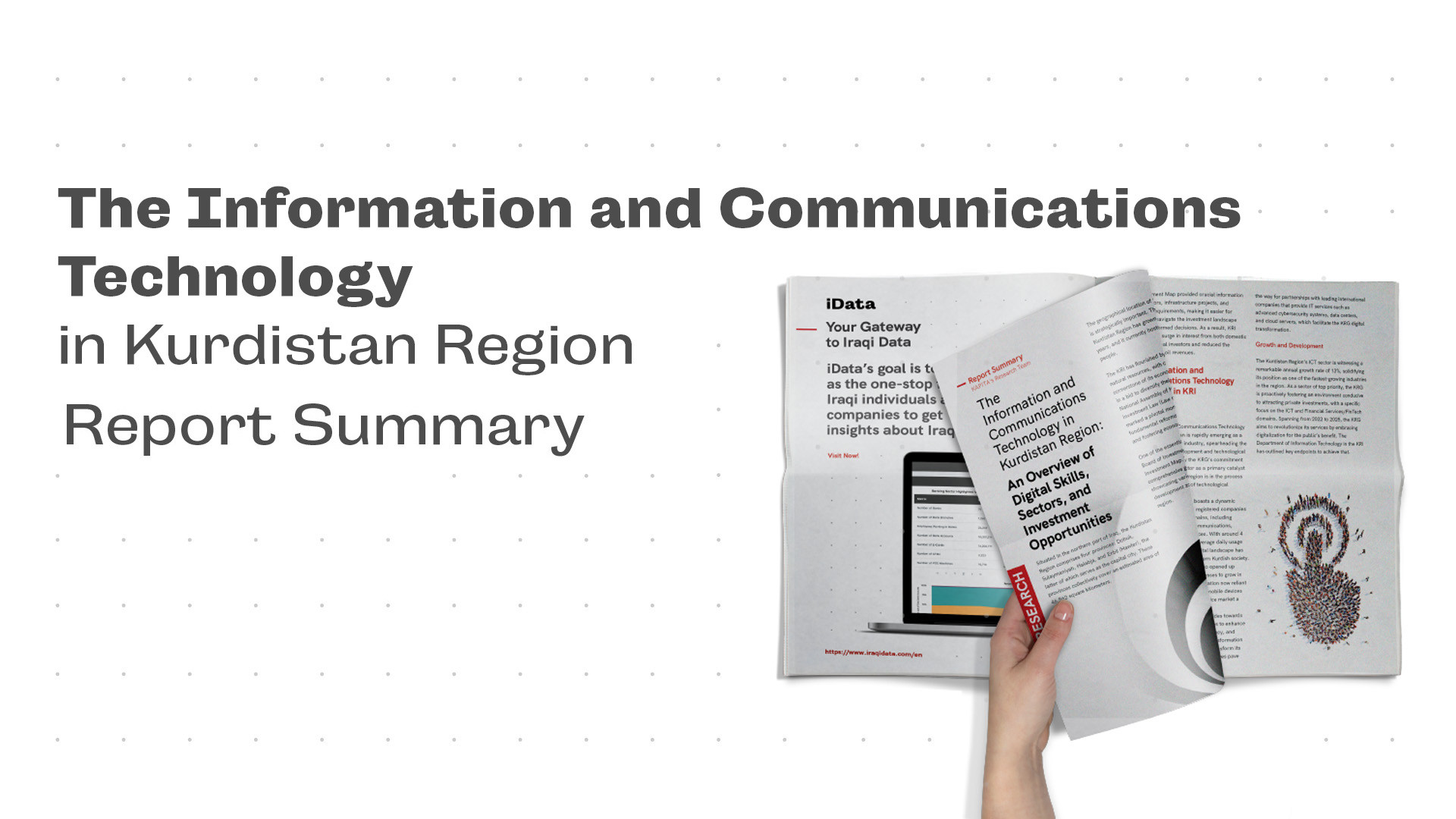Beyond the Buzzwords: The Core Elements, Unique Challenges, and Opportunities for Digital Transformation in Iraq
Difaf Alassam
Regional Credit Administration Manager (MENA), Grofin
Digital transformation has become a buzzword in the business world, often associated with going paperless or updating systems. However, it goes beyond just technology implementation and requires a fundamental shift in culture and processes to improve customer experience and operational efficiency. We will explore the core elements of digital transformation and how it is revolutionizing the investment industry, as well as the unique challenges and opportunities in Iraq.
Whilst we introduced the concept, it is important to consider the multifaceted processes and the complexities digital transformation entails. To successfully implement transformation, a clear strategy and execution plan must be put in place to align the core elements and attain the overall objectives and goals; the elements include:
People and Culture:
Bridging the overall objective of workplace culture requires effective transformational management that goes beyond using the tools at hand. It requires a transformation in attitude and, ultimately, trust in the process. Empowering employees with the knowledge of the benefits can lead them to embrace the changes rather than hinder the progress.
To promote agility, innovation and learning, a strategic and collaborative approach is necessary to harmonize the use of technology with the end user. To achieve this, businesses can promote various methods such as:
Agile methodologies and collaborative tools like Scrum and Kanban can reset the approach in which teams deliver projects by breaking down tasks and adapting to changes faster. Tools such as communication applications and project management software can help efficiency and align teams, resulting in stronger collaboration even in a distributed team setting.
Leveling-up skills is paramount to adapting technology in the workplace. Along with developing basic skills to strengthen the foundations of its teams, businesses can further provide training in cyber security, cloud computing, and data analytics.
Proactive and inclusive change management is critical in navigating digital transformation within the business. Software that segments its principles and tracks key functions such as culture mapping, stakeholder analysis, and conflict management can aid in addressing concerns and the resistance to change. By continuously analyzing data, tweaks in the strategy can be implemented to maximize effectiveness and control the alignment to the overall objective.
Processes, Data, and Technology:
Businesses can capitalize on the opportunities that come within the transformative stage to eliminate redundant functions and inefficiencies in outdated workflows. By making real-time decisions based on data captured and redesigning their processes, businesses can ensure effective automation and productivity.
At the core of the transformative revolution lies the identification of relevant technologies that provide the essential digital tools and solutions to capture data and drive innovation, leading to the key objective of enhancing the customer experience in a cost-effective manner.
By focusing on these three key areas, organizations can develop their operations and business models and optimize available tools. A winning strategy has seen organizations worldwide incorporate examples of the following:
Processes: Primarily, businesses seek a full scope of their operations. To do so, mapping out their processes is key and gives them a clear snapshot which then allows the integration of technology where needed. Whilst the list is ever expanding, tools such as Microsoft Visio and Lucidchart can be used for mapping, and business process management software (BPM) can automate and streamline implementation.
Data: Businesses can turn their collected information and treat it as an asset by maximizing their data. Managing its life cycle and analysis is fundamental, and whilst the industry is flooded with various tools and software to aid in this, most notably is the Artificial Intelligence (AI) and Machine Learning (ML) platforms that can exploit data, identify patterns, and make predictions.
Technology: Integrating the right technology can ‘make or break’ the digital transformation processes. Businesses need to further consider consequent scalability and flexibility and protect the organization against breaches and cyberattacks by using antivirus software, firewalls, and intrusion detection systems, which collectively serve to realize the end goal.
Digital Transformation and Investment
The global investment industry has seen a transformation with the adoption of cutting-edge technologies that tackle key factors such as risk management, portfolio management, and reporting, provide insight into market trends and behaviors, and improve operational efficiency.
At the forefront, the customer has also benefited from a revolutionized experience that includes self-service portals, personalized products and services, and digitized communication channels – we have certainly come a long way from standing in a queue at the bank.
However, along with these developments, the global market has also witnessed tighter regulations and industry standards. As technology and data processing are integrated into the fabric of the industry, the need to protect the privacy and security of personal information is magnified. This is true even in developing countries, where one can find regulations to protect personal data, such as the European Union General Data Protection Regulation (GDPR) and the California Privacy Rights Act (CPRA). Tax and audit requirements, anti-money laundry, and anti-terrorist financing standards have also seen significant developments in controls as the market is increasingly reliant on cross-border transactions.
To encapsulate this, investment companies are compartmentalizing various domains to capitalize on the opportunities digital transformation can bring, which can be highlighted as follows:
Value Proposition:
In order to maintain a relevant and competitive status, businesses are progressively placing customer needs at the heart of their operations. Businesses must position themselves to be able to meet new trends and demands as they emerge by staying ahead of the curve. Once the focus is on the customer, businesses will ensure growth and new customer outreach, thus, elevating the value of their current customer base and any new business gained.
Innovation:
The trial-and-error process in the design and development stage, accelerated by the advent of AI and modern technology, has allowed businesses to expedite much of their experimentations, quickly capturing lessons learned, and allowing innovation to flow.
Data:
Data is the new oil in the digital economy. A business can efficiently and quickly unlock opportunities, mitigate risks and diversify its offerings by investing in data centers. Through leveraging data analysis and technology, businesses can gain insights into how their customers react, behave, and ultimately what drives them to make purchase decisions, all of which can inform and guide successful decision-making.
Furthermore, the investment industry has greatly benefited from the various credit referencing platforms that provide investors with valuable insight into their investees. These platforms have supported investors make informed decisions about relevant risk factors and create more opportunities where possible, shifting from outdated and institutionalized practices.
Customer:
The surge of digital technology has transformed how businesses communicate with customers as traditional methods become increasingly obsolete. Whether from a marketing perspective, sales, or customer service, the drive to enhance the experience has seen the development of infinite software, tools, and platforms, all competing with the latest technologies. Even a matter as simple as a sign outside a shop may have gone through rigorous analysis to capture the customers’ attention.
Digital Transformation and Iraq’s Position
As Iraq looks to the future in a post-Covid-19 world; there has been a growing focus on digital transformation. Several notable initiatives that have been made in this field include:
A memorandum of understanding between UNDP and the Iraqi Government supporting digital transformation was signed in July 2022.
Kurdistan Region published its digital transformation strategy in October 2022.
In March 2023, Iraq launched an electronic passport portal that represents the first e-process for official documentation of its kind in the country.
However, the country faces substantial barriers which have the potential to prevent Iraq from entering and participating in the global digital economy. One of these challenges is the deprived and inadequate digital infrastructure that comprises the internet/broadband foundations, digital communication suits, data centers, cloud services, and enterprise portals.
Iraq also lacks a strong legal and regulatory framework that could serve as a backbone and allow individuals and businesses to navigate the digital landscape. Sufficient measures to protect against security breaches and data privacy have not been officiated. Iraq’s shortage of effort in implementing controls could discourage investment and innovation that clarity and consistency would otherwise allow.
A glaring contradiction in digital transformation can also be seen between the private and public sectors. With the emergence of the e-commerce industry in Iraq, innovative startups and fintech solutions companies are seemingly leading in the digital landscape. However, trailing behind is public sector services which still operate on rigid practices with no real centralization. For example, a recent trip to renew some official documentation in Baghdad required the physical movement of an application form 12 times between four offices spread across three floors in a governmental building, taking over five hours to complete – all by hand, and no computers were used but once.
Changing habits and culture is the biggest hurdle in the transformative objective in Iraq. The absence of skills, know-how, and trust is hindering the implementation processes. In a cash-based society where illiteracy rates remain high, and the education system lags behind on the global scale, the embrace of digital transformation may be limited in terms of supply and demand.
Having highlighted the obstacles, it is not all doom and gloom for Iraq. A new generation of innovative, motivated, and highly skilled individuals and entrepreneurs is leading the way and creating a self-regulated digital environment worthy of recognition on a global platform.
The digital transformation strategy implemented in the Kurdistan Region is also making great strides in digital transformation, with work underway for a centralized data center and the recent financial inclusion program, ‘My Account’ initiative, that will allow civil servants access to retail banking with bank cards furthering the use of digital payment systems. The strategy further sets out details on digital governance and architecture, human capital, user-centered design, security and privacy, and procurement. Most notably, the strategy highlights and promotes transparency and accountability.
Planting the seed of change with the electronic passport application may be the first step for the Federal Government of Iraq to test out how digital transformation can be implemented and gauge the public’s reaction to altering habits. This is certainly worth observing and may prove influential to what is to follow.
Conclusion
To successfully implement real transformation, there needs to be a commitment of the highest level. However, this commitment cannot lead to fruition without the involvement of all relevant stakeholders, whether within the private or public sector. Once an alignment and understanding are reached of the subject matter, it will inevitably and positively impact the progress in digital transformation.
As with the KRG initiative, accountability and transparency are needed and encouraged, and Iraq can and should look to the future; it must lean on its private sector to provide more opportunities and Information and Communications Technology (ICT) solutions and tune out the negative rhetoric that is endlessly regurgitated.
Digital transformation is an opportunity that can provide cost-effective operations, level-up skills and education, pave the way for global investment, create work opportunities and overcome disparities of years gone by.
The country will reach its objectives sooner rather than later by investing time, effort, and money into infrastructure, regulation, education, and initiatives. Change is happening; it is only a matter of time.






